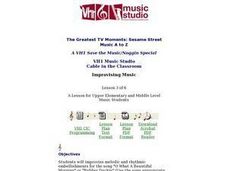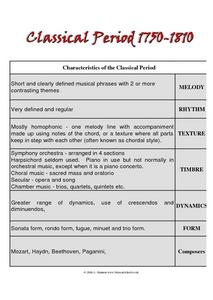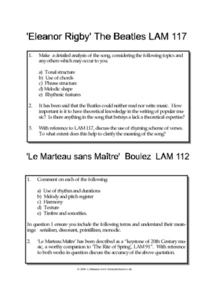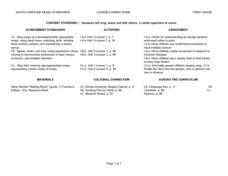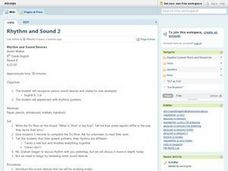Curated OER
I Spy Poetry
Young scholars identify and interpret the rhythm and form of the I Spy poem.
They then integrate art, music, literature, technology, and writing with poetry. Students also write their own poem based on the picture they printed from the I...
Curated OER
Going Up and Down
Second graders listen to and compare music to gain understanding of melodic direction in song, discuss types of movement in song, sing song while moving to it, and create movements that show pitches of melody moving upward, downward, or...
Curated OER
"Let's Write a Song"
Fourth graders analyze, brainstorm and practice playing a melody/pattern with rhythm, tempo, dynamics, and instrumental pieces of many styles. In addition, they create an original piece of music.
Curated OER
Improvising Music
Students watch "The Greatest TV Moments: Sesame Street Music A to Z" and improvise melodic and rhythmic embellishments for the song "O What A Beautiful Morning" or "Rubber Duckie."
Curated OER
the Baroque Period
Baroque styles in music, together with trends in tone, melody, and form are summarized in these slides. The points given are short and relevant. There is only a small amount of information, so this would be best as an accompaniment...
Curated OER
5 A Day
Students explore written music. For this cross-curriculum health and music lesson, students sing a "5 a Day" song about fruits and vegetables. Students clap a steady rhythm and identify written quarter notes in a 4/4 time...
Curated OER
A Round and A Round
Students practice singing rounds in daily warm-ups for 2 weeks prior to beginning this composition lesson. Students incorporate movement to the rhythm of each syllable, discuss syllables of words and their relationship to note values and...
Curated OER
A Melody Activity
Learners explore melody. In this music lesson, students define "melody" and identify the melody line present in increasingly complex musical pieces. Learners sing or hum the melody line after listening to an excerpt of music.
Curated OER
Classical Period Music - 1750-1810
In this classical music worksheet, students examine a graphic organizer that explains 7 characteristics of the music. They examine characteristics such as melody, timbre, texture, dynamics, and melody. There are no questions associated...
Curated OER
The Parts of Indian Music
In this Indian music worksheet, 7th graders examine a graphic organizer that displays the three parts of the music. They read about the Tala, Raga, and Drone before answering 5 short answer questions based on the reading.
Curated OER
Indian Music Fill in the Blank
In this Indian music worksheet, 7th graders fill in 8 blanks using the words from the word bank at the bottom of the page. They use words such as melody, sitar, tala, and pattern. They complete an extension lesson that focuses on Indian...
Curated OER
Analyzing Songs- Eleanor Rigby by the Beatles, and Le Marteau san Maitre by Boulez
In this song analysis worksheet, student examine the tonal structures, chords, melodies, and rhythm structures of two pieces of music. They examine "Eleanor Rigby" by the Beatles, and "Le Marteau san Maitre" by Boulez.
Curated OER
Medieval Music (c500 - 1450)
In this Medieval music instructional activity, 8th graders read about the instruments and parts of the music, including harmony, melody, and unison. They answer 7 homework questions based on the reading.
Curated OER
Compose Your Own Melody
In this music worksheet, students compose their own melody. Students read and play two lines of an example melody and simple bass part.
Curated OER
Music Terms Puzzle
In this music learning exercise, learners complete a crossword puzzle of fourteen basic music terms about instruments, beats, and performance groups.
Curated OER
Music Theory
Students properly notate a short melody within a given framework. They pay much attention to rhythmic notation. Students compose and harmonize their own melodies. They work individually on composing a melody on their preferred...
Curated OER
Misic: Stephen Foster's Folk Songs
Fifth graders examine the life and music of Stephen Foster. Via a Powerpoint presentation, they inspect a timeline of the composer's life. On a Website, 5th graders listen to different Foster songs including his parlor ballads,...
Curated OER
Singing And Making Rhythm
First graders engage in a instructional activity that emphasizes the use of music to form a rhythmic beat that incorporates singing. They create a song in freestyle and some of them create a song. Students are assessed at using hand...
Curated OER
Rhythm And Sound 2
Students review the concept of rhythm and this lesson looks at some specific sound devices in the study of music. They focus on assonance, consonance, and alliteration. Students define the concept of rhythm and give poetry as an example...
Curated OER
Echo Me! - A Melodic Dictation and Tonal Memory Game
Young scholars demonstrate five-finger hand positions (C, G, D, etc.) by playing short melodic phrases using only those notes in the given position and creating short melodies. Requires a networked keyboard lab.
Curated OER
Introduction To Melodic Notation: Sol-Mi
Second graders discover the use of melody in music and how it relates to simple songs and music notation. Students sing and move throughout this lesson. Emphasis is placed upon group and individual practice interpreting musical melodies.
Curated OER
The Travels of Babar: An Adventure in Scales
Students become familiar with the musical notify that are associated with the character in Monstel's The Travels of Babar: An Adventure in Scales, so that they can listen attentively to the performance and understand and appreciate ow...
Curated OER
Corn Husk Doll
Students practice melody and lyrics and the feelings they represent, in two languages, sing the melody of the Corn Husk Doll, lyrics Maria Hinton, melody by Patti Morin in Oneida, and discuss how the words to this song demonstrate...
Curated OER
VH1 Classic Presents: Paul McCartney: Chaos and Creation in the Backyard, Lesson 3
Students in a guitar class perform the Beatles song, Eleonor Rigby and study it's melodic and harmonic structures. They discover the process of arranging the song for a 4-part guitar ensemble.





